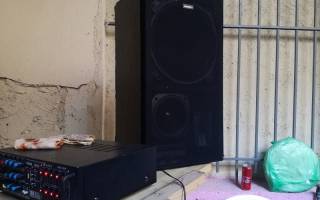A thinking, sounding and writing workshop and special issue on sound, space, race, representation, and coloniality.

In the context of postcolonial and black histories, human migrations have precipitated struggles to come into representation in spatial and political contexts that routinely silence particular voices. For marginalised communities, the challenge to speak and be heard has been key to staking claims on belonging. Yet, insofar as sound (and music) can be regarded as valuable forms of expressive culture, they are also spatially productive. From broadcast infrastructures, through domestic listening practices, to the underground genres of Black and migratory music cultures, sound is a medium that routinely produces new spaces and spatial lexicons for subaltern presencing. Sound is always moving, and stimulates movements of many kinds –social, spatial, cultural, political.
This project hears how sound carries: carries across geographies, histories, and disciplines; carries meanings, strategies of resistance, creative ways of being and knowing. We seek sonic imaginations that resonate across anticolonial geographies, exploded trajectories, ex-centric itineraries. We aim to build undisciplined conversations about sound, spatiality, and the politics of representation. As ‘rebellious inventions’ (McKittrick 2021: 164), sound brings collective and relational geographies into representation. This project hears new cartographies, resonant methods, and strategies of world-making that push against the ongoing colonialities of space, sound, voice, and representation.
One-day thinking, sounding, and writing workshop and special issue of Social Text
Our proposed activity centres on a collaborative thinking, sounding, and writing workshop –to be held in early summer 2022. This will be a one-day gathering, bringing together people working and thinking with sound, space, race, representation, and coloniality; from across and beyond UCL. The workshop will be a space for sharing and generating ideas, without a disciplinary or geographic centre. And it aims to galvanise and give shape to a form of sonic scholarship that all the project collaborators are already working on, but that will forge new synergies and collaborations, and will be nourished by such an opportunity to think and sound together.
These conversations will build towards a special issue of the journal Social Text, slated for publication in 2023. This will be co-edited by the project co-leads – Prof Jazeel and Dr Western – and will feature articles written or co-written by project collaborators, and shorter pieces (that we’re calling echoes) of creative nonfiction on the project’s themes. The workshop and the special issue are conceived together, with each strengthening the other. The workshop is designed as a space for collective experimentation in writing on sound, with the goal of creating a coherent and collective special issue, that will advance conversations on music and sound, spatiality and racialisation, migration and representation.
This might sound quite conventionally academic, but our aim is to foster an emergent form of music/sound studies that remains largely unheard in music departments and along traditional lines of discipline. We think this is an opportunity to bring UCL further into global conversations about sonic politics, and to establish UCL as a centre where work on these questions is taking place. Our project fits with the scope of Music Futures in two key ways. First, we share aims of collaboration and creativity, and thinking sonically without the disciplinary baggage of a music department. And second, we are interested and invested in what happens beyond the scope of Music Futures.
Our project brings together a community of people working on sound, space, and race across UCL, and expands this community through collaboration with people elsewhere with similar methods of sounding, writing, and listening. Its builds on and feeds back into the work of both project co-leads: to Prof Jazeel’s work on the spatial politics of British Asian dance music; and to Dr Western’s research on sound and citizenship in migratory contexts in Greece. Sound Carries is well placed to carry beyond the timeframe of the Music Futures scheme, and to contribute to UCL becoming a centre of creative music research.
 Close
Close

